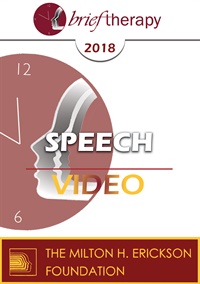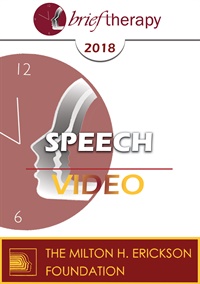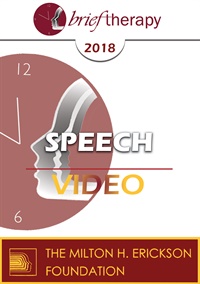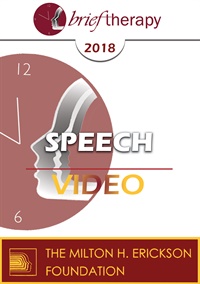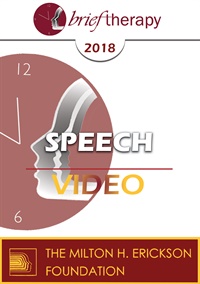Credit available - Click Here for more information
- Average Rating:
- Not yet rated
- Topic Areas:
- Speeches | Mindfulness | Narcissism | Brief Therapy | Self-Esteem
- Categories:
- Brief Therapy Conference | Brief Therapy Conference 2018 | Online Continuing Education
- Faculty:
- Ronald Siegel, PsyD
- Course Levels:
- Master Degree or Higher in Health-Related Field
- Duration:
- 1:00:31
- Format:
- Audio and Video
- Original Program Date:
- Dec 09, 2018
- Short Description:
- What if our therapeutic goals of improving self-esteem, developing a stable and coherent sense of self, and expressing our authentic feelings all turn out to be misguided? What if they inadvertently feed the cultural enthusiasm for celebrity and success that makes so many of us miserable? This presentation will examine how mindfulness practices can be harnessed in psychotherapy to reexamine our conventional sense of self, leading both us and our clients toward greater well-being, wisdom, and compassion.
- Price:
-
Sale is $29.00
price reduced from Base Price - $59.00
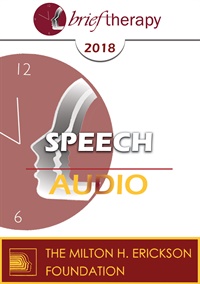
- Average Rating:
- Not yet rated
- Topic Areas:
- Speeches | Marriage | Sex and Sexuality | Brief Therapy | Couples Therapy
- Categories:
- Brief Therapy Conference | Brief Therapy Conference 2018
- Faculty:
- Michele Weiner-Davis, LCSW
- Duration:
- 38:54
- Format:
- Audio Only
- Original Program Date:
- Dec 09, 2018
- Short Description:
- One out of every three couples struggles with mismatched sexual desire---a formula for marital disaster. When one spouse is sexually dissatisfied and the other is oblivious, unconcerned, or uncaring, sex isn't the only casualty; a sense of emotional connection can also disappear. Helping couples bridge the desire gap can be challenging when one spouse appears unmotivated or lacks empathy. It can also be challenging when therapists feel uncomfortable discussing sex. This speech presents a collaborative model for partners to work together to turn around the decline in their sex lives and reignite their emotional connection.
- Price:
- $15.00 - Base Price
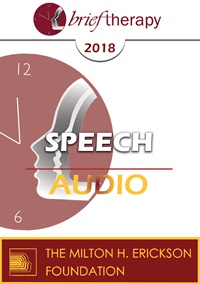
- Average Rating:
- Not yet rated
- Topic Areas:
- Speeches | Multicultural | Strategic Therapy | Brief Therapy | Strengths-Based
- Categories:
- Brief Therapy Conference | Brief Therapy Conference 2018
- Faculty:
- Terry Soo-Hoo, PhD
- Duration:
- 1:42:11
- Format:
- Audio Only
- Original Program Date:
- Dec 09, 2018
- Short Description:
- The Culturally Sensitive Strength-Based Strategic Therapy method was developed to integrate various principles founded by the Mental Research Institute (MRI) and Jay Haley’s Strategic Therapy approach as well as other methods to address these issues. In this workshop, guidelines will be presented for learning the principles of Culturally Sensitive Strength-Based Strategic Therapy. There will be an emphasis on effective strategies in working within the cultural context of the client and how this is critical to successful therapy. A structure will be presented for organizing the specific tasks and skills involved in different aspects of the method including activating the client’s strengths. Case examples, some on video recordings, will illustrate many innovative brief therapy techniques.
- Price:
- $15.00 - Base Price
Credit available - Click Here for more information
- Average Rating:
- Not yet rated
- Topic Areas:
- Speeches | Trauma | Brief Therapy | Future Oriented | Post-Traumatic Stress Disorder (PTSD)
- Categories:
- Brief Therapy Conference | Brief Therapy Conference 2018 | Online Continuing Education
- Faculty:
- Bill O'Hanlon, MS
- Course Levels:
- Master Degree or Higher in Health-Related Field
- Duration:
- 57:49
- Format:
- Audio and Video
- Original Program Date:
- Dec 09, 2018
- Short Description:
- People with post-traumatic stress often suffer for years and develop a variety of troubling and often crippling problems. This talk will detail a philosophy and methods of working briefly and effectively with people who have been traumatized. An array of new methods have shown that previous conceptions and methods of working with trauma are unnecessarily long-term and re-traumatizing. These new approaches, rather than being based on the past and deterministic models, are oriented towards the present and future and a sense of possibilities. You will leave equipped with a different understanding of how to treat trauma and four specific methods you can use right away in your work.
- Price:
-
Sale is $29.00
price reduced from Base Price - $59.00
Credit available - Click Here for more information
- Average Rating:
- Not yet rated
- Topic Areas:
- Speeches | Obsessive Compulsive Disorder (OCD) | Brief Therapy
- Categories:
- Brief Therapy Conference | Brief Therapy Conference 2018 | Online Continuing Education
- Faculty:
- Reid Wilson, PhD
- Course Levels:
- Master Degree or Higher in Health-Related Field
- Duration:
- 1:01:32
- Format:
- Audio and Video
- Original Program Date:
- Dec 09, 2018
- Short Description:
- The rigid beliefs and bizarre behavior of clients with obsessive-compulsive disorder (OCD) can seem intimidating to any therapist. But if you look under the hood, the driving force of this dominant disorder is always the same: something could go terribly wrong and it will be your fault. Treatment can be difficult, but it is not complex. Participants will learn the core strategies of treatment and the primary tactics to confront client resistance.
- Price:
-
Sale is $29.00
price reduced from Base Price - $59.00
Credit available - Click Here for more information
- Average Rating:
- Not yet rated
- Topic Areas:
- Speeches | Belief Systems | Brief Therapy | Neuroscience
- Categories:
- Brief Therapy Conference | Brief Therapy Conference 2018 | Online Continuing Education
- Faculty:
- Robert Dilts, BA
- Course Levels:
- Master Degree or Higher in Health-Related Field
- Duration:
- 1:01:49
- Format:
- Audio and Video
- Original Program Date:
- Dec 09, 2018
- Short Description:
- ]Managing the process of change involves working with a number of levels of key factors. These factors include our environment (where and when we act), our behavior (what we do), our capabilities (how we think and plan), our values and beliefs (why we think and act the way we do), and our identity (who we perceive ourselves to be) and our sense of purpose (for whom and for what we dedicate ourselves). The presentation will explore the relevance of these different levels of influence to brief therapy and how they may be identified and addressed to help clients reach their therapeutic goals.
- Price:
-
Sale is $29.00
price reduced from Base Price - $59.00
Credit available - Click Here for more information
- Average Rating:
- Not yet rated
- Topic Areas:
- Speeches | Brief Therapy | Neuroscience | Psychotherapy | Therapist Development
- Categories:
- Brief Therapy Conference | Brief Therapy Conference 2018 | Online Continuing Education
- Faculty:
- Michael Yapko, PhD
- Course Levels:
- Master Degree or Higher in Health-Related Field
- Duration:
- 1:02:31
- Format:
- Audio and Video
- Original Program Date:
- Dec 09, 2018
- Short Description:
- Conventional wisdom can guide us but also confuse us when seemingly good pieces of advice contradict each other (e.g., “Look before you leap…BUT he who hesitates is lost”). How can someone know when to do this rather than do that? How can we help clients make better decisions in order to improve the quality of their lives? The fields of cognitive neuroscience and phenomenology have offered us many insights into decision-making processes and some of these will be discussed as they apply to the context of active, short-term psychotherapies.
- Price:
-
Sale is $29.00
price reduced from Base Price - $59.00
Credit available - Click Here for more information
- Average Rating:
- Not yet rated
- Topic Areas:
- Speeches | Children and Adolescent Therapy | Art and Creativity | Brief Therapy | Family Therapy | Anxiety | Depression | Goals of the Therapist
- Categories:
- Brief Therapy Conference | Brief Therapy Conference 2018 | Online Continuing Education
- Faculty:
- Lynn Lyons, LICSW
- Course Levels:
- Master Degree or Higher in Health-Related Field
- Duration:
- 1:02:45
- Format:
- Audio and Video
- Original Program Date:
- Dec 09, 2018
- Short Description:
- We don't often think of creativity and problem solving as equal partners in therapy with children. But when struggling families arrive at your office, it is the immediate blending of these two components that allows you and the family to move quickly from overwhelmed to engaged, confused to targeted. Based on 29 years of successes and failures, this speech will offer ideas to immediately connect with families, help them untangle the tired messiness they often arrive with, and create active interventions that build momentum, create new patterns, and offer hope.
- Price:
-
Sale is $29.00
price reduced from Base Price - $59.00
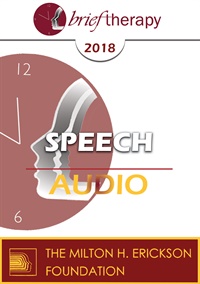
- Average Rating:
- Not yet rated
- Topic Areas:
- Speeches | Brief Therapy | Trauma | Anxiety | Hypnosis | Pain and Healing | Dissociation
- Categories:
- Brief Therapy Conference | Brief Therapy Conference 2018
- Faculty:
- Camillo Loriedo, MD, PhD
- Duration:
- 1:00:42
- Format:
- Audio Only
- Original Program Date:
- Dec 09, 2018
- Short Description:
- Dissociative hypnotic intervention demonstrated to be very useful in treating pain, anxiety disorders and many other conditions. But hypnosis can as well reactivate the natural mind processes, contributing to reconnect different parts (distinct modes of information processing) into a functional and unified self, particularly after traumatic experiences. Rapport, the special relationship that produces intense interpersonal links and connections, as well as profound disconnections with non-hypnotic reality, can be considered a crucial factor of brief therapeutic approach to dissociative conditions and trauma. How to use rapport as well as other new specific therapeutic interventions to reestablish the natural integrative links in a dissociative mind and relationship will be outlined in this presentation.
- Price:
- $15.00 - Base Price
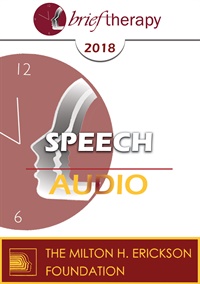
- Average Rating:
- Not yet rated
- Topic Areas:
- Speeches | Brief Therapy | Psychotherapy | Solution Oriented Approach
- Categories:
- Brief Therapy Conference | Brief Therapy Conference 2018
- Faculty:
- Elliott Connie, MA, LPC
- Duration:
- 59:30
- Format:
- Audio Only
- Original Program Date:
- Dec 09, 2018
- Short Description:
- The Solution Focused Approach is a widely accepted way of conducted psychotherapy sessions. Over the past 40 years this approach has come to be known for its brevity, pragmatism and positive stance. However, many inaccurate myths about this approach exist which impact many clinicians' ability to understand, and subsequently use, this approach. There is one misunderstanding that stands above all others, and this workshop will directly address this common misunderstanding while showing to not succumb to this idea and how to follow the true essence of Solution Focused work.
- Price:
- $15.00 - Base Price
Please wait ...


